Roy Pea
ConvoLearn: A Dataset of Constructivist Tutor-Student Dialogue
Jan 13, 2026Abstract:In educational applications, LLMs exhibit several fundamental pedagogical limitations, such as their tendency to reveal solutions rather than support dialogic learning. We introduce ConvoLearn (https://huggingface.co/datasets/masharma/convolearn ), a dataset grounded in knowledge building theory that operationalizes six core pedagogical dimensions: cognitive engagement, formative assessment, accountability, cultural responsiveness, metacognition, and power dynamics. We construct a semi-synthetic dataset of 1250 tutor-student dialogues (20 turns each) in middle school Earth Science through controlled interactions between human teachers and a simulated student. Using QLoRA, we demonstrate that training on this dataset meaningfully shifts LLM behavior toward knowledge-building strategies. Human evaluation by 31 teachers shows our fine-tuned Mistral 7B (M = 4.10, SD = 1.03) significantly outperforms both its base version (M = 2.59, SD = 1.11) and Claude Sonnet 4.5 (M = 2.87, SD = 1.29) overall. This work establishes a potential framework to guide future development and evaluation of constructivist AI tutors.
Advancing Quantum Information Science Pre-College Education: The Case for Learning Sciences Collaboration
Aug 01, 2025Abstract:As quantum information science advances and the need for pre-college engagement grows, a critical question remains: How can young learners be prepared to participate in a field so radically different from what they have encountered before? This paper argues that meeting this challenge will require strong interdisciplinary collaboration with the Learning Sciences (LS), a field dedicated to understanding how people learn and designing theory-guided environments to support learning. Drawing on lessons from previous STEM education efforts, we discuss two key contributions of the learning sciences to quantum information science (QIS) education. The first is design-based research, the signature methodology of learning sciences, which can inform the development, refinement, and scaling of effective QIS learning experiences. The second is a framework for reshaping how learners reason about, learn and participate in QIS practices through shifts in knowledge representations that provide new forms of engagement and associated learning. We call for a two-way partnership between quantum information science and the learning sciences, one that not only supports learning in quantum concepts and practices but also improves our understanding of how to teach and support learning in highly complex domains. We also consider potential questions involved in bridging these disciplinary communities and argue that the theoretical and practical benefits justify the effort.
AI in the Writing Process: How Purposeful AI Support Fosters Student Writing
Jun 25, 2025Abstract:The ubiquity of technologies like ChatGPT has raised concerns about their impact on student writing, particularly regarding reduced learner agency and superficial engagement with content. While standalone chat-based LLMs often produce suboptimal writing outcomes, evidence suggests that purposefully designed AI writing support tools can enhance the writing process. This paper investigates how different AI support approaches affect writers' sense of agency and depth of knowledge transformation. Through a randomized control trial with 90 undergraduate students, we compare three conditions: (1) a chat-based LLM writing assistant, (2) an integrated AI writing tool to support diverse subprocesses, and (3) a standard writing interface (control). Our findings demonstrate that, among AI-supported conditions, students using the integrated AI writing tool exhibited greater agency over their writing process and engaged in deeper knowledge transformation overall. These results suggest that thoughtfully designed AI writing support targeting specific aspects of the writing process can help students maintain ownership of their work while facilitating improved engagement with content.
CogGen: A Learner-Centered Generative AI Architecture for Intelligent Tutoring with Programming Video
Jun 25, 2025Abstract:We introduce CogGen, a learner-centered AI architecture that transforms programming videos into interactive, adaptive learning experiences by integrating student modeling with generative AI tutoring based on the Cognitive Apprenticeship framework. The architecture consists of three components: (1) video segmentation by learning goals, (2) a conversational tutoring engine applying Cognitive Apprenticeship strategies, and (3) a student model using Bayesian Knowledge Tracing to adapt instruction. Our technical evaluation demonstrates effective video segmentation accuracy and strong pedagogical alignment across knowledge, method, action, and interaction layers. Ablation studies confirm the necessity of each component in generating effective guidance. This work advances AI-powered tutoring by bridging structured student modeling with interactive AI conversations, offering a scalable approach to enhancing video-based programming education.
Tutorly: Turning Programming Videos Into Apprenticeship Learning Environments with LLMs
May 21, 2024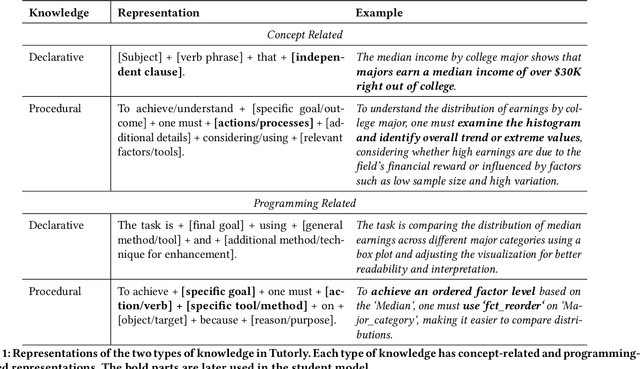
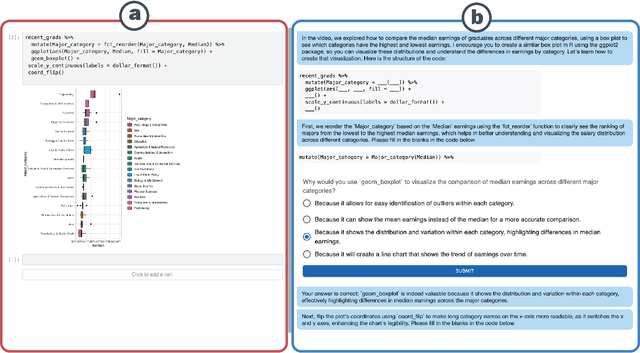
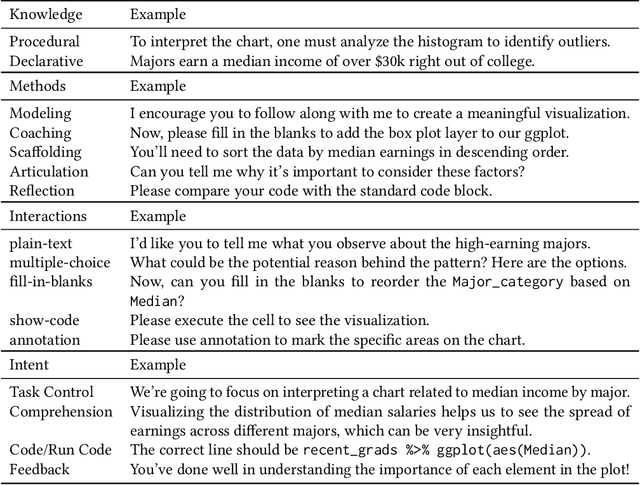
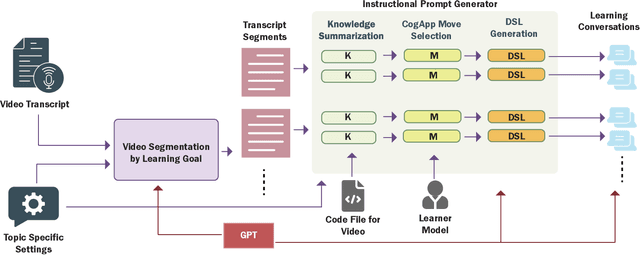
Abstract:Online programming videos, including tutorials and streamcasts, are widely popular and contain a wealth of expert knowledge. However, effectively utilizing these resources to achieve targeted learning goals can be challenging. Unlike direct tutoring, video content lacks tailored guidance based on individual learning paces, personalized feedback, and interactive engagement necessary for support and monitoring. Our work transforms programming videos into one-on-one tutoring experiences using the cognitive apprenticeship framework. Tutorly, developed as a JupyterLab Plugin, allows learners to (1) set personalized learning goals, (2) engage in learning-by-doing through a conversational LLM-based mentor agent, (3) receive guidance and feedback based on a student model that steers the mentor moves. In a within-subject study with 16 participants learning exploratory data analysis from a streamcast, Tutorly significantly improved their performance from 61.9% to 76.6% based on a post-test questionnaire. Tutorly demonstrates the potential for enhancing programming video learning experiences with LLM and learner modeling.
A Design Space for Intelligent and Interactive Writing Assistants
Mar 26, 2024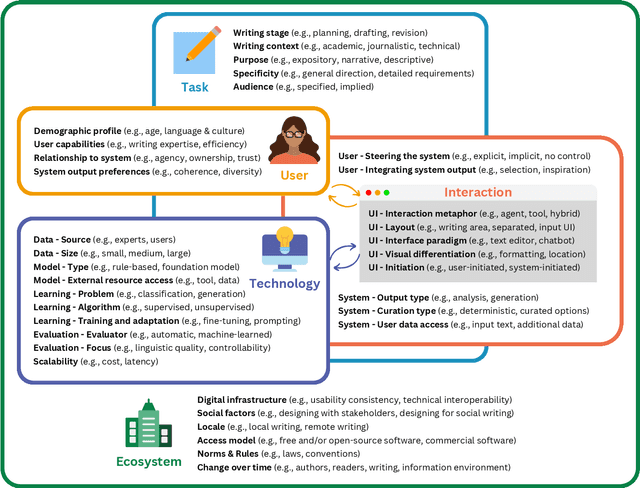
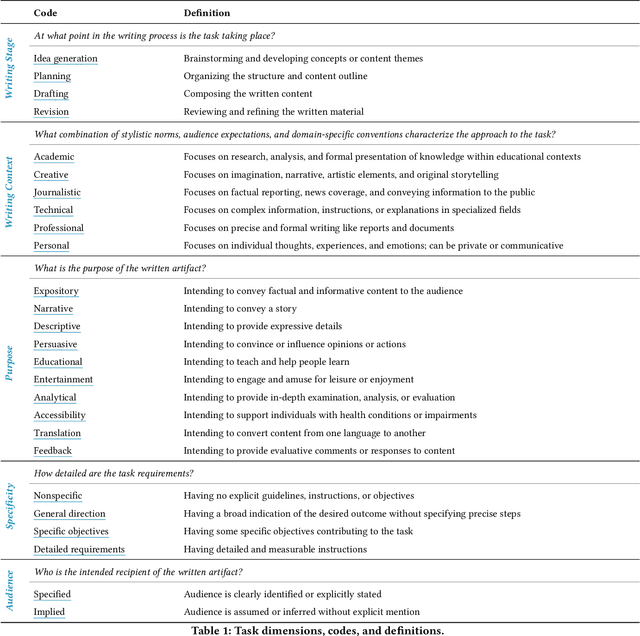
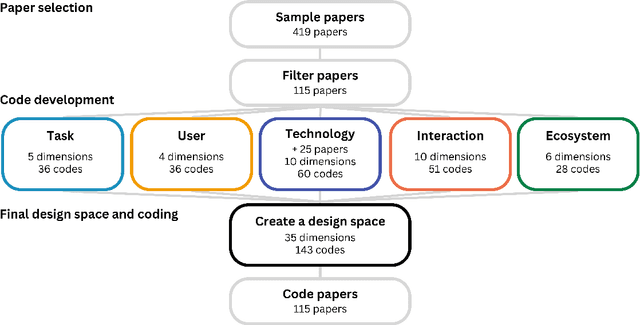
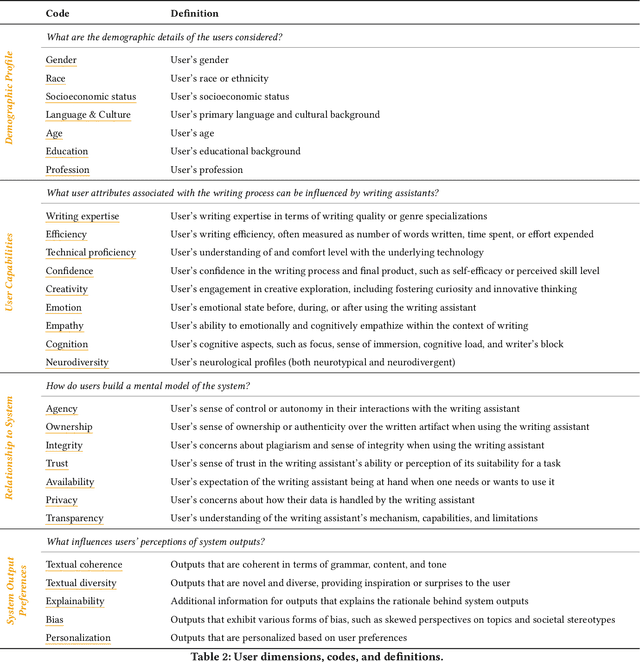
Abstract:In our era of rapid technological advancement, the research landscape for writing assistants has become increasingly fragmented across various research communities. We seek to address this challenge by proposing a design space as a structured way to examine and explore the multidimensional space of intelligent and interactive writing assistants. Through a large community collaboration, we explore five aspects of writing assistants: task, user, technology, interaction, and ecosystem. Within each aspect, we define dimensions (i.e., fundamental components of an aspect) and codes (i.e., potential options for each dimension) by systematically reviewing 115 papers. Our design space aims to offer researchers and designers a practical tool to navigate, comprehend, and compare the various possibilities of writing assistants, and aid in the envisioning and design of new writing assistants.
 Add to Chrome
Add to Chrome Add to Firefox
Add to Firefox Add to Edge
Add to Edge